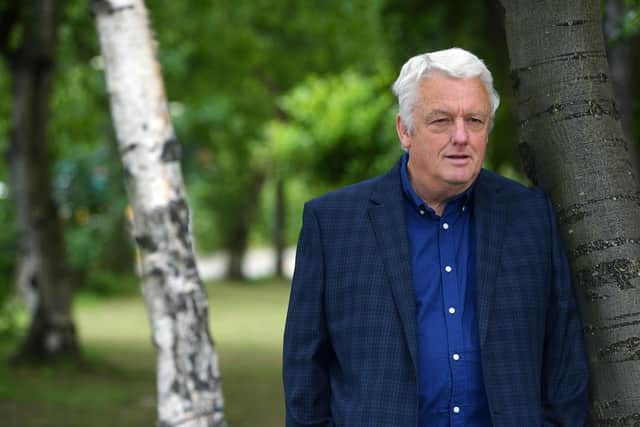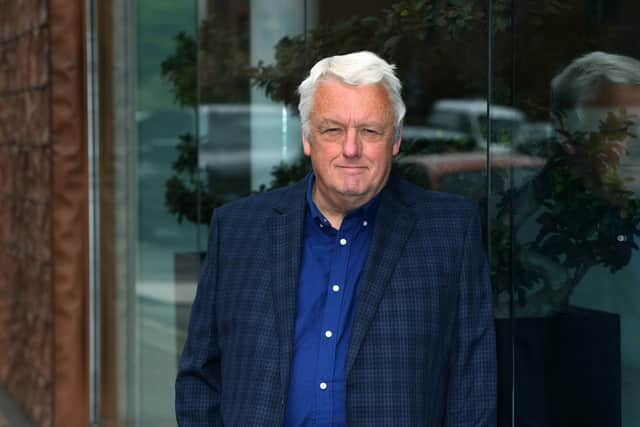Running public services like a business left us totally unprepared for pandemic, says Yorkshire TUC boss Bill Adams
and live on Freeview channel 276
Bill Adams casts his mind back several decades to his first council job in Lancashire as he sets out why he believes the UK was ill-prepared to cope with the coronavirus pandemic of 2020.
With Lancashire County Council responding to serious flooding in Fleetwood, he was called in to be part of an emergency response team, which saw him drive to nearby Warrington and bring back 5,000 blankets for local victims.
Advertisement
Hide AdAdvertisement
Hide Ad"I was amazed as a young lad at the civil defence planning that was available, there was enough food to feed all of Lancashire for a month," he says, describing the resources available to local authorities at the time. "All of that's gone now, it's been sold off, privatised and discarded."
Now the Yorkshire and the Humber Regional Secretary for the Trade Unions Congress, a federation of trade unions representing millions of members, he passionately believes the last ten years of cuts to public services mean the country is poorly-placed to respond to similar emergencies.
"We've had this pandemic forced upon us, what is evident is that for the last few number of years we've been totally unprepared for anything like this", he says.
"We've been running our public services as businesses, and when it comes to protecting the public, I'm afraid the government hasn't had the nouse or the facilities to do it when we really needed it, that's why we've got so many dead.
Advertisement
Hide AdAdvertisement
Hide Ad

"When something happens like this you know you need to have the capacity to fight back. Health services have been running on 'just-in-time' production lines, that's OK to build cars, to build washing machines, if you can do it economically by just having the right parts in the right time.
"But when you've got something like a health pandemic you've got no proper provision for PPE, for the staff and you haven't got a proper testing system even though you knew that one day something will come along.
"You get into a situation where suddenly you have an emergency on your hands and it's getting out of control and you don't have the resources or facilities or plans to do anything about it.
"I think people realise that if you want to have a decent society to live in, the state has got to play a part. And I think if you look around the world, the light-touch economies of some states is where the economy has been hit worst. And where you've had the state playing a role in the economy, where you've got good social partnership, they've tended to be less hit."
Advertisement
Hide AdAdvertisement
Hide Ad

At 62, Mr Adams has been involved with unions his entire adult life. After leaving school he turned his hand to a variety of jobs, including stints as a postman, driver, milkman and council worker and factory worker, but has always been the workplace union rep.
Deciding to become a mature student at the age of 30, studying Law at the University of Central Lancashire, he went on to lecture in law and trade union studies at colleges in Manchester, Leeds, Preston and London before taking on the role at the TUC.
But having experienced the miners' strike and the financial crash, he says the brutal impact of the pandemic on workers has been the toughest thing he has faced in his career.
"There will be people who lose their jobs or have to change jobs and I think that's where I think the TUC could play a role as it's already been doing with government, particularly in terms of safety of workplaces that are starting to open again, the activities around key workers who kept the economy and the health service and public services going.
Advertisement
Hide AdAdvertisement
Hide Ad"It's been unprecedented for unions to be involved at that level for a long, long time, going back to the 70s, so it is unprecedented in most people's work history."
Along with the business-led Confederation of British Industry, the TUC has played a major role in the creation of Rishi Sunak's job retention scheme and how it can benefit workers. And his vision is that unions will continue to be highly influential in ensuring that well-paid and sustainable jobs are available for people once the country emerges from the pandemic.
He points out that the crisis is running in parallel to the climate emergency, meaning that Yorkshire's recovery needs to be based around a transition to a low-carbon economy.
The TUC estimates that almost 30,000 workers in Yorkshire and the Humber are directly at risk from job losses in high polluting industries and has prepared a number of big policy recommendations on how it can press ahead with a green transition without waiting for government.
Advertisement
Hide AdAdvertisement
Hide Ad"We've got this emergency on our backs at the moment, but six months ago, we were talking about the climate emergency and what we have to do to save the planet.
"This has been a momentous time for most people, probably as momentous as the Second World War, but the next 20 years are also going to be momentous for workers, how they adapt and change to meet the requirements of the Climate Act and what that will look like for jobs.
"I think we're in for a really busy time. What we'd like to be is an equal social partner, and not an organisation, that's brought in when it's needed, a serious player around industrial planning, skills agenda for kids coming out of school and for workers to be retrained, how we can work with local authorities, combined authorities, and the new mayoral system that seems to be evolving in northern regions.
"We need our feet under the table, not only just arguing for things for our members but also constructing a new society."
Advertisement
Hide AdAdvertisement
Hide AdOne of the TUC's main policy recommendations in Yorkshire is investment in major transport infrastructure projects like the mass transit system planned for West Yorkshire.
Mr Adams says he is pushing mayoral authorities in the North to spend big on transport to improve access to jobs.
"I remember I went to see some kids in Barnsley who were leaving school and they said to me, there's no jobs here. I said 'you're not that far from Leeds, and there's jobs in Leeds. I nearly got run out of the building, they said 'we're not going to Leeds for a job'.
"If there was a good transport system, it wouldn't be a problem. If you look at London, people travel an hour on the tube which is like going from Manchester to Leeds. We just don't have that infrastructure."